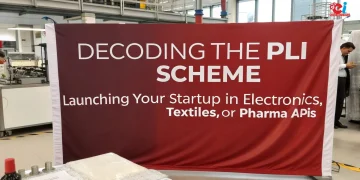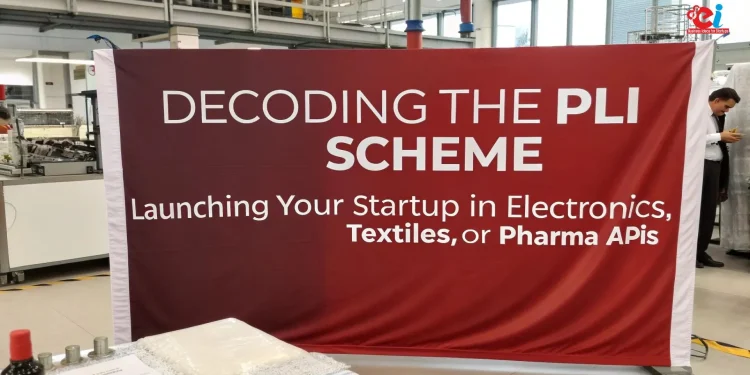PLI as India’s Industrial Catalyst
India is leapfrogging toward self-sustaining manufacturing driven by aggressive policies, and at the center of this industrial renaissance is the Production Linked Incentive (PLI) scheme. With a total outlay of more than ₹2 lakh crore, India’s government launched the PLI scheme covering 14 strategic sectors with the vision of turning India into a global manufacturing hub by strengthening home production, foreign investments, and reducing key import dependencies.
Once limited by scale or infrastructure, startups and MSMEs are now being encouraged to emerge at the heart of India’s growth story in sectors like electronics, technical textiles, and pharmaceutical active pharmaceutical ingredients (APIs). However, for them to fully capitalize, there is a need for clarity on policies beyond paperwork—be it processes, design, infrastructure requirements, or demand forecasting.
This article provides a deep feasibility analysis along with a sector-wise project blueprint to launch your startup under the PLI scheme in three high potential industries – Electronics Manufacturing, Technical Textiles, and Pharma APIs – crucial to India’s import substitution and export growth.
Explained: The PLI Framework for Business Owners
The Production Linked Incentive scheme serves a purpose beyond the mere subsidization of industrial output. It is specifically tailored to support firms that meet, not just investment milestones, but real output and incremental sales benchmarks. The intent behind this scheme is to support and reward productive and quality-centered manufacturing and to bring pervasive performance-driven manufacturing into the industrial economy.
Some of the key characteristics of the scheme:
- Incentives are disbursed as a percentage of incremental sales over a base year.
- The incentive period usually spans 5 years, and compliance with quality, localization, and capacity targets is mandatory.
- Preference is given to Greenfield projects, startup-led innovation, and domestic value addition.
- Linked with national priorities such as Atmanirbhar Bharat, Make in India, and India as a global export base.
Related: Production-Linked Incentive (PLI): Powering India’s MedTech Revolution
Sector 1: Electronics Manufacturing
(Focus – Mobile Components & PCB Assemblies)
India’s import of electronic goods surpassed $72 billion in FY 2024. The PLI scheme for large-scale electronics manufacturing is designed to replace the import of hardware with locally produced alternatives. This came with a government subsidy of ₹38,645 crore to the sector, with active engagement from mobile phone manufacturers, semiconductor firms, and component suppliers.
For startups, the secondary niche lies with the production of:
- Mobile subcomponents such as camera modules, connectors, and vibration motors.
- Surface Mount Devices (SMDs) and embedded systems for IoT devices, smartphones, laptops, and routers.
Due to the proliferation of 5G phones, smart home gadgets, and wearable technology, these components are becoming increasingly popular.
Moderate – Entry through Electronics Manufacturing Services (EMS) setup is possible for PCB Assemblies while Mobile Camera Modules require high precision niche opto-mechanical micro soldering, making it a stable market for specialized craftsmen providing job opportunities.
With state subsidies and plug-and-play infrastructure alongside central PLI incentives, Electronics Manufacturing Clusters such as Noida, Bengaluru, and Chennai are suitable locations to set up these facilities.
Sector 2: Technical Textiles
(Focus – Defense, Medical, and Infrastructure Fabrics)
Technical textiles received a budget of ₹10,683 crore under the PLI scheme. Historically, India has lagged in this sector due to lack of capital, low domestic awareness, and reliance on imports for performance fibers and coatings.
The aim now is to establish a complete domestic ecosystem—from high tenacity yarns and fire-retardant fabrics to antimicrobial textiles.
Startups can produce the following:
- Geotextiles for use in road construction and soil erosion control.
- Defence and ballistic materials, including substitutes for Kevlar.
- Medical textiles such as masks, gowns, and wound care fabrics.
- Athletic wear and UV-protective outdoor clothing.
Snapshot: Manufacturing Overview
| Product | Raw Materials Required | Process | Infrastructure Needed |
| Geotextiles | – | Nonwoven spinning, Thermal bonding | Moderate (requires web lines) |
| Medical Nonwovens | Polypropylene meltblown | Spunbond fiber, SMS machine lines | Moderate (high in demand), lamination units |
| Ballistic Fabrics | UHMWPE, Aramid fibers | Weaving, Lamination, Resin coating | Defense license niche |
Specialized clusters are being set up in Gujarat, Maharashtra, and Telangana, making small-scale specialized plants economically viable because these regions offer additional capital subsidies and cluster-based incentives.
Related: Smart Textiles: The Intersection of Fashion and Technology
Sector 3: Pharmaceutical APIs
While India is often referred to as the ‘Pharmacy of the World’, the country ironically imports over 65% of its bulk drugs (APIs) from China. This is especially true for critical ingredients used in antibiotics, anti-infectives, vitamins, and steroidal treatments.
To help combat this dependency, the government introduced the PLI scheme with a budget of ₹15,000 crore for 41 high-priority APIs, such as:
- Fermentation-based APIs – e.g., penicillin and erythromycin.
- Chemical synthesis APIs – e.g., metformin, ibuprofen.
- Hormone and steroid APIs – e.g., hydrocortisone, progesterone.
API Manufacturing Snapshot:
| API Type | Route of Manufacturing | Raw Materials Required | Regulatory Needs |
| Fermentation-Based | Microbial fermentation, downstream recovery | Culture media, precursors | GMP, cGMP, Pollution Control |
| Chemical Synthesis | Multi-step organic chemistry | Intermediates, solvents, catalysts | ICH Guidelines, DMF Filing |
| Steroid Hormones | Stereospecific synthesis, crystallization | Sterol sources, enzymes | High Precision, Plant Controls |
API units must be GMP-compliant and have properly designed effluent treatment systems. States like Telangana, Himachal Pradesh, and Andhra Pradesh provide plug-and-play pharma parks and single-window clearances for manufacturing API startups.
Why Startups Should Leverage the PLI Scheme Now
For startups especially, the versatility of the PLI scheme not being one-size-fits-all works to their advantage:
- Defining highly sought-after products that larger businesses or importers avoid.
- Balanced production capacity to meet demand efficiently via cluster-based fabrication.
- Partnerships with OEMs and contract manufacturers participating in the PLI framework.
Startups aligned with the eligible product lists, register their manufacturing companies, and meet localization requirements become entitled to a rebate of 6–10% cash-back on annual turnover, unlocking faster break-even and improved working capital.
5-Year Demand Forecast: Projected Sector-Wise Domestic and Export Demand
| Sector | 2025 | 2026 | 2027 | 2028 | 2029 |
| Electronics | ₹5,00,000 Cr | ₹5,80,000 Cr | ₹6,70,000 Cr | ₹7,80,000 Cr | ₹9,00,000 Cr |
| Technical Textiles | ₹25,000 Cr | ₹30,000 Cr | ₹36,000 Cr | ₹43,000 Cr | ₹51,000 Cr |
| APIs | ₹1,45,000 Cr | ₹1,65,000 Cr | ₹1,90,000 Cr | ₹2,20,000 Cr | ₹2,50,000 Cr |
Demand is also fueled by domestic markets like smartphones, infrastructure, and generics. Furthermore, India’s growing global export role supports demand—especially after the COVID pandemic—as global supply chains look for alternatives to China.
For more information check out the related video on this article
How NPCS Assists Entrepreneurs To Tap Into PLI-Eligible Sectors
Opening a manufacturing unit under the PLI scheme is a lot more than just filling out forms—understanding raw material sourcing, plant layout, manufacturing sequence, and compliance is crucial.
Niir Project Consultancy Services (NPCS) helps entrepreneurs with the fundamental building blocks to create viable, scalable businesses.
NPCS offers:
- Techno-Economic Feasibility Studies for market survey focused on electronics, textiles, and APIs.
- Complete documentation comprising of the manufacturing process, raw material list, compliance pathways, and plant layout.
- Guidance aimed at assessing a startup’s viability, sustainability, and alignment with PLI policies.
Which business to start? How to choose a business idea?
Conclusion: PLI Is Not Just a Policy, It’s a Manufacturing Ecosystem
India’s future lies in building what it consumes—and exporting what it excels in. The PLI scheme, unlike one-time subsidies, provides a growth-linked pathway for startups to scale sustainably across high-demand sectors.
Whether you’re assembling high-precision PCBs, weaving smart fabrics for defence, or synthesizing life-saving APIs, the production-linked structure ensures you grow only by delivering quality, value, and volume. It de-risks your industrial venture, attracts funding, and aligns your business with India’s strategic trade and export agenda.
For new-age entrepreneurs, PLI is not just an incentive—it’s a roadmap to industrial relevance.


















